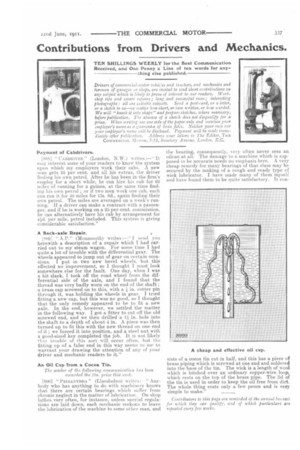Contributions from Drivers and Mechanics.
Page 17

If you've noticed an error in this article please click here to report it so we can fix it.
TEN SHILLINGS WEEKLY for the Best Communication Received, and One Penny a Line of ten words for any thing else published.
Drivers of commercial-motor vehic:es and tractors, and mechanics and foremen of garages or shops, are invited to send short contributions on any subject which is likely to prove of interest to our readers. Work. shop tips and smart repairs ; long and successful runs; interesting photographs : all ore suitable subjects. Send a post -card, or a letter, or a sketch to us—no matter how short, or how written, or how worded. We will " knock it into shape" and prepare sketches, where necessary, before publication. The absence of a sketch does not disqualify for a prize. When writing use one side of the peeper only and mention your employer's name as a guarantee of bona fides. Neither your own nor your employer's name will be disclosed. Payment will be made immediately after publication. Address your letters to The Editor, THE COMMERCIAL MO MR, 7-15, Rosebery Avenue. London, E.G.
Payment of Cabdrivers.
LtisS] " CABDRIVER " (London, NAV.) writes:--It may interest some of your readers to know the system upon which my employers work their cabs. A new man gets 25 per cent, and all his extras, the driver finding his own petrol. After he has been in the firm's employ for a short while, he can hire his cab for 62 miles of running for a guinea, at the same time finding his own petrol ; or if two men work one cab, each can run it for 40 miles for 13s. 6d., again finding their own petrol. The miles are averaged on a week's running. If a driver can make a contract with a passenger, and if he is working on a 25-per-cent. commission, he can alternatively have his cab by arrangement for 4id. per mile, petrol included. This system is giving considerable satisfaction."
A Back-axle Repair.
LS..539_1 A.P." (Monmouth) writes:—" I send you herewith a description of a repair which I had carried out to my steam wagon. For some time I had quite a lot of trouble with the differential gear. The wheels appeared to jump out of gear on certain occasions. I put in two new bevel wheels, but this effected no improvement, so I thought I must look somewhere else for the fault. One day, when I was a bit slack, I took off the road wheel from the differential side of the axle, and I found that the thread was very badly worn on the end of the shaft ; a brass cap screwed on to this, with a in. cotter pin through it, was holding the wheels in gear. I tried fitting a new cap, but this was no good, so I thought that the only remedy appeared to be to fit a new axle. In the end, however, we settled the matter in the following way. I got a fitter to cut off the old screwed end, and we then drilled a 11 in. hole into the shaft to a depth of about 4 in. A piece was then turned up to fit this with the new thread on one end of it ; we forced it into position, and a steel nut with a good-sized key completed the job. It is not likely
I trouble of I his sort will occur often. but the fitting up of a false end in this way seems to me to warrant your drawing the attention of any of your driver and mechanic readers to it."
An Oil Cup from a Cocoa Tin.
The sender of the following communication has been awarded the 10s. prize, this. week.
[890] " PEIRANYDDA " (Llandudno) writes: --" Anybody who has anything to do with machinery knows that there are certain bearings which suffer from chronic neglect in the matter of lubrication. On shop lathes very often, for instance, unless special regulations are laid down, each mechanic reckons to leave the lubrication of the machine to some other man, and the bearing, consequently, very often never sees an oilcan at all. The damage to a machine which is supposed to be accurate needs no emphasis here. A very cheap remedy for many bearings of that class may he secured by the making of a rough and ready type of wick lubricator. I have made many of them myself and have found them to be quite satisfactory. It eon sista of a cocoa tin cut in half, and this has a piece of brass piping which is screwed at one end and soldered into the base of the tin. The wick is a length of wool which is hitched over an ordinary copper-wire loop, which rests on the top of the brass pipe. The lid of the tin is used in order to keep the oil free from dirt. The whole thing costs only a few pence and is very simple to make."
Contributors to this page are reminded of the annual bmuses for which they can qualify, and of which particulars are repeated every few weeks.


















